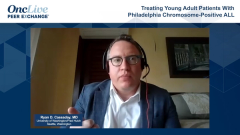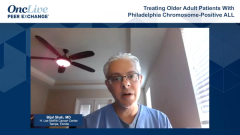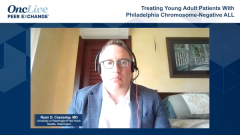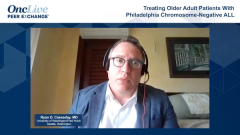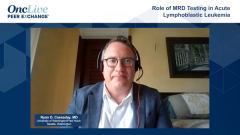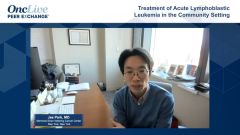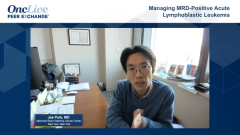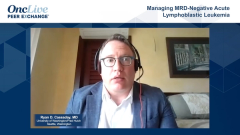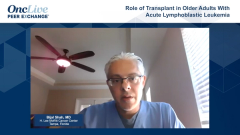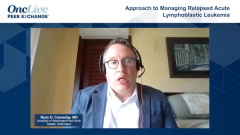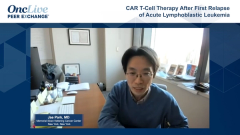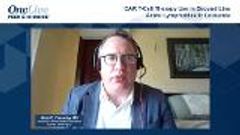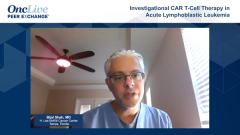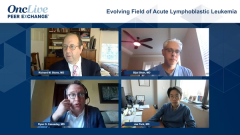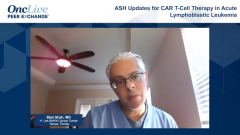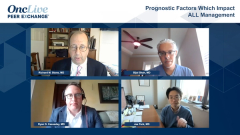
Treating Older Adult Patients With Philadelphia Chromosome-Negative ALL
Episodes in this series

Richard M. Stone, MD: A group that doesn’t have good answers is the Philadelphia-negative older adults, who can’t tolerate hyper-CVAD. But there’s some interesting data coming out of The University of Texas MD Anderson Cancer Center and elsewhere. Let’s start with Ryan. Have you changed your approach with older adults with Philadelphia chromosome–negative disease?
Ryan D. Cassaday, MD: This is may be 1 of the most challenging patient populations right now. There are newer approaches coming down the pike, both from MD Anderson and US cooperative group studies. I have not yet routinely incorporated the mini hyper-CVD [cisplatin, vinblastine, dacarbazine]–inotuzumab combination, which has been published and was studied primarily in older adults. With many of these regimens, where these newer agents are being brought into the frontline setting, the incremental gain might be seen relative to added toxicity and potentially losing options down the road for relapses.
One thing we use at our center the University of Washington Fred Hutchinson Cancer Research Center, based on preliminary experience of a study we have going so far, at least for relatively fit older adults with Ph-negative ALL [acute lymphoblastic leukemia], they’re using dose-adjusted EPOCH [etoposide, prednisolone, oncovin, cyclophosphamide, hydroxydaunorubicin], a regimen that is fairly well known to many community oncologists. The study has been open for a few years. This is a group of patients for whom there isn’t a great standard. There have been some good successes, at least initially. It’s still a fairly toxic regimen, with cytopenias and some of the same issues that kind of occur with hyper-CVAD [cyclophosphamide, vincristine, doxorubicin, dexamethasone], but it’s not quite as intense.
Richard M. Stone, MD: Bijal, what about in Tampa, for older adults with ALL?
Bijal Shah, MD: We tend to use the DFCI [Dana-Farber Cancer Institute] protocol, and that is something that was brought forward. My colleague Julio Chavez wanted to explore its activity in our older adult patients, and we found it to be very effective with a lot of dose modifications.
Richard M. Stone, MD: Is that CVD [cisplatin, vinblastine, dacarbazine] and venetoclax?
Bijal Shah, MD:No, this is the old pediatric-inspired regimen for older adults, the 1 that uses a dose-deintensified induction followed by consolidation with intensified CNS [central nervous system].
Richard M. Stone, MD: That’s the old Larson regimen that I think you’re referring to. I would think I would know that 1, but I don’t.
Bijal Shah, MD: It’s 7 consecutive asparaginase phases in consolidation.
Richard M. Stone, MD: That must be older than me, because I’m really old.
Bijal Shah, MD: It’s been well tolerated, and what we learned was the critical importance of deintensifying that induction. That’s where we’re losing a lot of our patients, during that induction phase. We’ve stepped it down. Most patients will receive VINC/DEX [vincristine, dexamethasone] or VINC/DEX [vincristine, dexamethasone] asparaginase as their induction, without the doxorubicin or the methotrexate component, and we’ve been quite pleased.
The mini-CVD [cisplatin, vinblastine, dacarbazine]–inotuzumab data are very interesting. It’s also toxic, and it’s hard for our older patients when they develop cytopenias, particularly when they’re prolonged, to carry them through that phase. It’s been a struggle to push that into the frontline setting for our older patients. The data are really good: I think it’s 70% at 1 year were in remission. But the survival was still only around 50%. They’re still losing a significant proportion of patients because of toxicity with that approach. Dr Hagop Kantarjian mentioned dropping it to 2 cycles instead of 4, and maybe that will be sufficient then to help to mitigate some of that toxicity.
Richard M. Stone, MD: The people over age 70 really can only tolerate, begin the first 2 cycles of mini hyper-CVD [cisplatin, vinblastine, dacarbazine]. It’s really tough. I’ve given it to some people, so I can certainly corroborate that. Jae, how do you approach older adults with Philadelphia [chromosome]–negative ALL?
Jae Park, MD: We at Memorial Sloan Kettering Cancer Center are using more of an INO [inotuzumab ozogamicin]/mini-CVD [cisplatin, vinblastine, dacarbazine]–based regimen between 60 and 65 [years old] and the 70-to-75 range. I rarely will get them through all 8 cycles of those. We do MRD [minimal residual disease] assessment after 3 cycles and after 3 months of treatment. Depending on the performance status and MRD status, we may convert into the blinatumomab consolidation for some. As Ryan alluded to, we are using a lot of our armamentarium there, but these older patients. We may not be able to consolidate with a transplant. There are some potential concerns, but with these are groups it’s too hard to get hyper-CVAD [cyclophosphamide, vincristine, doxorubicin, dexamethasone] and even dose-adjusted asparaginase, which we haven’t explored much. We used to have a protocol, but we have moved to the INO [inotuzumab ozogamicin]/mini-CVD [cisplatin, vinblastine, dacarbazine]–based induction followed by either continuation with chemotherapy or consolidation with the BLIN [blinatumomab].
Richard M. Stone, MD: The next older-adult trial done by the cooperative groups led by Dr Marlise Luskin is going to be mini hyper-CVD [cisplatin, vinblastine, dacarbazine], INO [inotuzumab ozogamicin], the MD Anderson regimen vs the agreed-upon standard of care, which was dose reduced hyper-CVAD [cyclophosphamide, vincristine, doxorubicin, dexamethasone] as a control arm. The venetoclax plus mini hyper-CVD [cisplatin, vinblastine, dacarbazine] has had a very high MRD-negative response rate that was tolerable, but it was not deemed ready for prime time either.
Transcript Edited for Clarity


